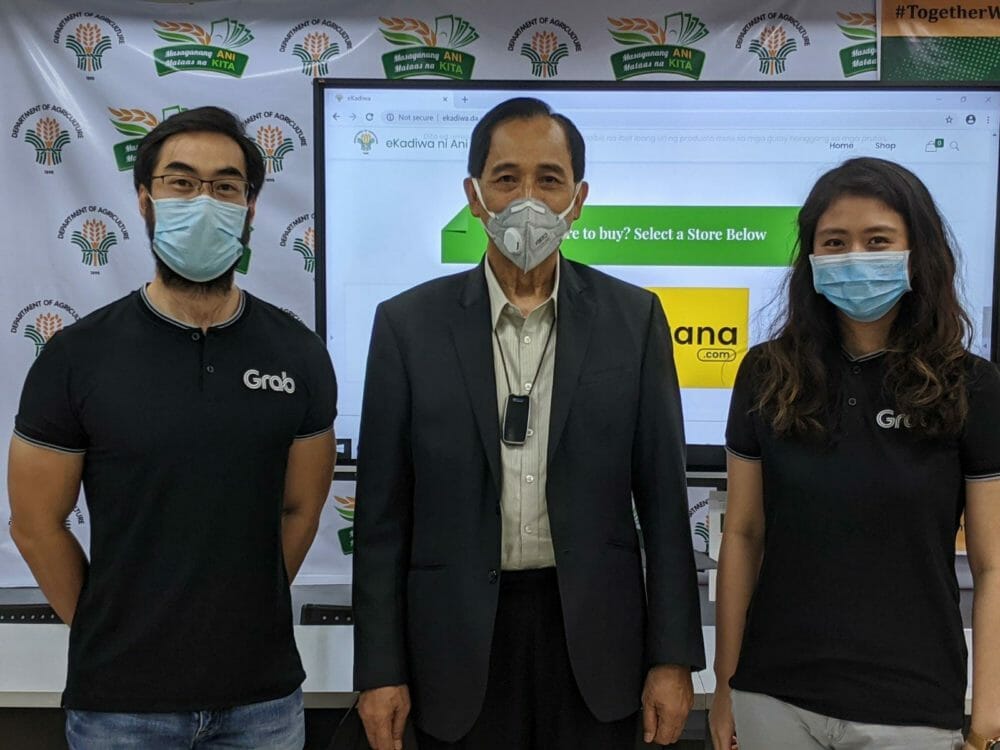Southeast Asian order-anything app Grab has launched a raft of initiatives aimed at bringing more small and medium-sized merchants into its ecosystem, including farmers and agrifood vendors, amid supply chain disruption and other knock-on effects from Covid-19.
Grab started out as a ride-hailing service, but it has since expanded into myriad other services including food delivery, e-grocery, and financial services. Its platform allows users to order from tens of thousands of restaurants, hawkers, and grocery stores across Southeast Asia.
The Singapore-based ‘super app’ announced several initiatives yesterday which will see it work with government and enterprise to digitalize traditionally offline segments of the agrifood ecosystem, and bring them onto its app.
“These partnerships aim to expand economic opportunities for farmers and agricultural producers across the region by enabling them to earn directly from sales off the Grab platform [and] at the same time ease concerns around food security,” the company said in a statement.
Ag marketplace initiatives
Grab has partnered with Indonesia’s Ministry of Agriculture to allow users of its GrabAssistant ‘e-concierge’ service to order from ‘Pasar Mitra Tani,’ a state-owned grocery store that sources produce directly from farmers, and have their purchases delivered to their doorstep. Farmers stand to earn more through this arrangement since Grab handles most of the distribution, negating the costs of multiple intermediaries. Through its GrabMart grocery delivery feature, the company is also teaming up with fishermen in Ambon, in the country’s far east, to sell their catch to customers in Jakarta.
Last month, it unveiled a partnership with Indonesian e-commerce unicorn Bukalapak, which claims to work with 5 million warung (mom-and-pop stalls) across the country. The partnership will see Grab’s platform for warung owners, GrabKios, provide digital products on Bukalapak’s agent network, Mitra Bukalapak, which can be sold by kiosk owners and agents to their customers.
Elsewhere, Grab is running a pilot with Malaysia’s Ministry of Rural Development and rural entrepreneur platform eLokal DesaMall to help 5,000 businesses digitalize and sell goods via GrabMart and food delivery marketplace GrabFood.
Over in the Philippines, Grab has joined ‘Kadiwa ni Ani at Kita,’ a state-run network of grocery stalls which buys produce from local farmers and fishermen and sells them on to customers across the country. Buyers will be able to make purchases on the Ministry of Agriculture-backed eKadiwa website and receive their goods from GrabExpress, the app’s on-demand courier service.
The Philippines has turbocharged its Kadiwa farm-to-consumer marketplace with tech to soften the blow from Covid-19. Read more here
Thailand’s Ministry of Agriculture & Cooperatives has called on Grab to assist farmers across three of the kingdom’s provinces to sell their surplus fruit crop using a new ‘Farmer’s Market’ on GrabMart.
Beyond agriculture, Grab also announced yesterday a new platform aimed at micro-entrepreneurs named GrabMerchant. According to Grab, the integrated service will help food vendors and other business owners “grow their online customer base [and] optimize their operations, while keeping costs in check.” It will include sales and marketing analytics tools that can provide actionable insights, advertising campaigns, and a wholesale marketplace for buying stock and having it delivered the next day. Merchants will also be onboarded onto Grab’s digital payments infrastructure, GrabPay, enabling them to handle both online and mobile transactions.
“A very long winter”
Last month, Grab co-founder Tan Hooi Ling told CNA that the company is “preparing for the worst case scenario, which is potentially a very long winter,” as many of its business units took a hit from Covid-19.
Overall revenue was “lower than it used to be pre-Covid”, she said. Grab’s flagship ride-hailing business had seen a substantial drop in revenue since the pandemic took hold in Southeast Asia, while its food delivery and courier services had each seen an uptick, she added.
Nevertheless, Grab said yesterday that it onboarded more than 78,000 merchants in March and April this year, as well as signing up over 115,000 individuals as drivers or delivery partners. Small businesses using its platform recorded a 21% increase in online revenue generated via Grab over the same period.
Grab’s recently released annual sustainability report claimed that the company contributed an estimated $8.5 billion to Southeast Asia’s economy in the 12 months leading up to March, taking both sales and the incomes of drivers, food vendors, and other Grab subcontractors into account.
“Covid-19 will require exceptional collaborative efforts from all levels of society to overcome,” Tan said. “Private companies like Grab are using our platform and tech to find ways for even the smallest micro-entrepreneur or business to continue sustaining their livelihoods in these challenging times.”
Grab’s regional archrival Gojek said last week that it had received an undisclosed amount of funding from Facebook, Google, PayPal, and Tencent. While Jakarta-based Gojek has reportedly raised around $4.5 billion in total since launching in 2010, Grab has banked an estimated $9.9 billion since its 2012 launch from investors including Goldman Sachs, Toyota, SoftBank, and Microsoft. Credit card giant Visa has backed both companies.
Got a news tip? Email me at [email protected]





